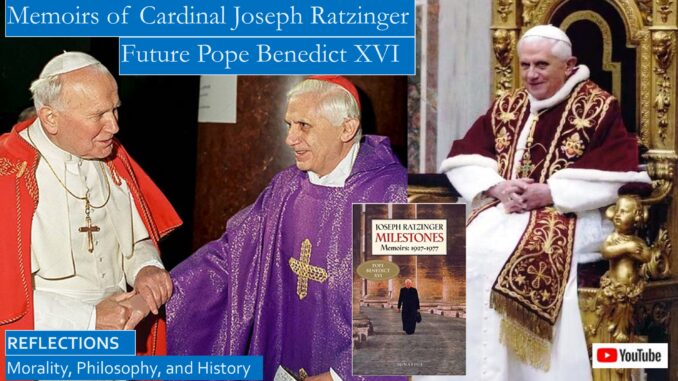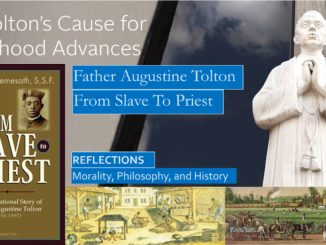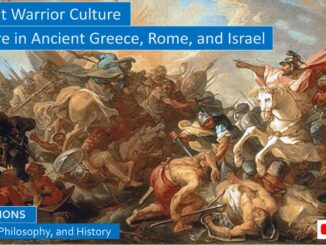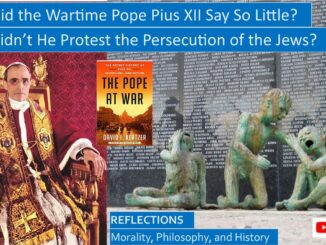
Cardinal Ratzinger, who would later be crowned as Pope Benedict XVI, was the rare erudite theologian who never lost the simplicity of a child in his wonderment both of ideas and of people and nature. His theology was both intellectually profound and was internalized in his soul, his humanity was expressed through his intellect while his childlike humility was lived through his faith.
As a young man, the young Ratzinger remembers that “the Church year gave time its rhythm, and I experienced that with great gratitude and joy already as a child, indeed, above all as a child.”
YouTube video: https://youtu.be/tkfJq1zYtkU
Script for this video, with more Amazon book links: https://www.slideshare.net/BruceStrom1/early-memoirs-of-pope-benedict-xvi-as-cardinal-joseph-ratzinger
Throughout his life he had a childlike love of the faith. Young Ratzinger remembers, “I received the complete missal for every day of the year. Every new step into the liturgy was a great event for me. Each new book I was given was something precious to me, and I could not dream of anything more beautiful.” “This mysterious fabric of texts and actions had grown from the faith of the Church over the centuries. It bore the whole weight of history within itself, and yet, at the same time, it was much more than the product of human history.”[1]
Ratzinger was a teenager through the traumatic years of World War II, though his rural family did not suffer as much deprivation and bombing as did the Germans who lived in the cities. His family were devout Catholics who abhorred Nazism. Ratzinger rues, “My father was one who with unfailing clairvoyance saw that Hitler’s victory would not be a victory for Germany but rather a victory of the Antichrist that would surely usher in apocalyptic times for all believers, and not only for them.”[2]
One of the themes of this channel is that the lessons learned from the traumatic World War II experience greatly influenced the calling of the Second Vatican Council and its many reforms, as well as the American Civil Rights legislation, both of which happened in the Sixties.
Ratzinger observes that the first World War also caused a change in theological outlooks. He remembers, “with its million dead, with all the horrors that technology made possible as an instrument of war, the First World War was experienced as the collapse of the liberal dogma of progress.” “Under the shock of this experience, people now turned again to what previously had been looked upon as superseded: namely, the Church, the liturgy, the sacraments, and this not only in the Catholic sphere but especially in the Protestant world. Karl Barth’s Epistle to the Romans became a declaration of war on liberalism and a manifesto of a new and consciously ecclesial theology.”[3]
JOSEPH RATZINGER’S YOUTH
Cardinal Ratzinger tells us, “I was born on Holy Saturday, April 16, 1927.” “I was baptized immediately on the morning of the day I was born with the water that had just been blessed.” “To be the first person baptized with the new water (of Easter) was seen as a significant act of Providence.”
His early years were not easy for his family, he recalls that “unemployment was rife; war reparations weighed heavily on the German economy; battles among the political parties set people against one another; endless illnesses visited our family. But there were also many beautiful memories of friendship and neighborly aid, memories of small family celebrations and of church life.”
Ratzinger continues: “The inability of the German republic to create political stability and hence engage in convincing political action became apparent even to a child in the turbulent clash of the parties. The Nazi Party gained ever stronger ascendancy by declaring itself the only alternative to the threatening chaos.”[4]
When Ratzinger was still a child, Hitler became chancellor of the Reich, the Fuhrer, in 1933. The younger Ratzinger remembers: “The Hitler Youth and League of German Girls were introduced, and my brother and sister were obliged to participate in their activities. It mortified my father to have to work now for a government whose representatives he considered to be criminals,” though the local police were largely unaffected.
The young Ratzinger remembers that the Nazi regime initiated “the practice of spying and informing on priests who behaved as ‘enemies of the Reich.’” “My father had no part in this. On the contrary,” in his position as a policeman, “he would warn and aid priests he knew were in danger.” The battle against Catholic parochial schools began, few were willing to support these institutions, many older German resented the clergy.[5] Many German Christians were conflicted and torn between their support of the church and their support for the totalitarian Nazi state.
His father was able to retire when he turned sixty in 1937, the family then bought an old farmhouse at the edge of town. Our young Ratzinger recalls, “the house came with a big meadow where two enormous cherry trees grew as well as apple, pear, and plum trees grew. The property was bounded on one side by a grove of oak trees that you could reach by taking only a few steps, and you could wander for hours in an endless pine forest.”
Young Ratzinger observed that “an education in Greek and Latin antiquity created a mental attitude that resisted seduction by a totalitarian ideology.” The Reich introduced a new type of school that eliminated the study of these ancient languages and cultures, but they permitted those students already on the classical track to continue, knowing this would disappear once these students graduated.
The pastor urged him to enter a minor seminary, which he entered in Easter of 1939. But the war interfered, when Hitler invaded Poland later that year, the minor seminary was declared a military hospital, but the school was able to relocate several times, using different facilities. The Nazis murdered many Polish Priests, but did not harm many German priests, even permitting them to serve as chaplains in the military services. After that, France was invaded, then the Balkans, but the announced invasion of Britain was delayed, then indefinitely postponed.
Ratzinger recalls, “I will never forget that sunny Sunday in 1941 when we received news that Germany had launched with her allies an attack against the Soviet Union on a front reaching from the North Pole to the Black Sea. On this day my class had arranged a little boat trip on a neighboring lake. The outing was fine, but the news about this new extension of the war hung over us like a nightmare and spoiled our joy.” After the invasion was underway, every day the newspaper announced another local soldier’s death at the front.[6]
When Joseph Ratzinger reached military age in 1944, he was drafted into the military service in a work detail since he was studying to be a priest. When the front started approaching, rather than being transferred into a combat unit, for some reason the members of the work detail were given their civilian clothes and were sent closer to home on the railways. When the end seemed near after Hitler committed suicide around April 1945, Ratzinger decided to abandon his unit and return home.[7]
THEOLOGICAL STUDIES
After the war, young Ratzinger continued his theological studies, although many seminaries continued to serve as military hospitals, and the destruction and destitution of Germany meant that many libraries were either destroyed or inaccessible and scholarly books were scarce.
Our young Ratzinger discusses books and ideas as if they were best friends. Ratzinger remembers, “We found the philosophy of personalism reiterated with renewed conviction in the great Jewish thinker Martin Buber. This encounter with personalism was for me a spiritual experience that left an essential mark, especially since I spontaneously associated such personalism with the thought of St Augustine, who in his Confessions had struck me with the power of all his human passion and depth. By contrast, I had difficulties in penetrating the thought of St Thomas Aquinas, whose crystal-clear logic seemed to me to be too closed in on itself, too impersonal and ready-made.”[8]
Later Cardinal Ratzinger had a love-hate relationship with the historical-critical method of biblical interpretation. This method seeks to interpret Scripture afresh, seeking the original meaning of the text using modern linguistic tools, archeology, and other scientific and historical tools. Later, when under his direction the 1994 Pontifical Biblical Commission issued the Vatican Decree on Biblical Interpretation, he expressed his preference for the patristic interpretation, and cautioned the uncritical use of the historical-critical method of interpretation, although he validated its value as a secondary method in interpreting Scripture. Our video has an expanded discussion of the historical-critical method.
In his memoirs, the young Ratzinger notes that “the candid questions from the perspective of the liberal-historical method created a new directness in the approach to Sacred Scripture and opened up dimensions of the text that were no longer perceived by the all-too-predetermined dogmatic reading.”
Young Ratzinger’s theological studies in Munich centered around the daily celebration of the Holy Mass, and he attended a series of lectures on the liturgy. Ratzinger recalls that his prior impressions of the liturgical movement were that it “concentrated too much on forms and historical origins and had a remarkable coldness,” but at Munich he fell in love with the beauty of the liturgy, viewing liturgy as the “living element of theology, without which it would shrivel up.” But he warns, “I was not able to foresee that the negative sides of the liturgical movement that would afterward reemerge with redoubled strength, almost to the point of pushing the liturgy toward its own self-destruction.”
Likewise, the young Ratzinger notes that “dogma was conceived, not as an external shackle, but as the living source that made knowledge of the truth possible in the first place. The Church came to life” “in the liturgy and in the great richness of the theological tradition.”
Although during the time of his studies the historical method was favored, it has its weaknesses. Ratzinger gives as an example the doctrine of Mary’s bodily assumption into heaven. When all the theological faculties were consulted for their opinion, one of the Munich professors proved that the doctrine was unknown before the fifth century, which meant that in an historical sense, it could not be proven to be part of the church tradition.
But Ratzinger argues that this is only true “if you understand tradition strictly as the handing down of fixed formulas and texts, which was the position of their professors. But if you conceive of tradition as the living process whereby the Holy Spirit introduces us to the fullness of truth and teaches us how to understand what previously we could not grasp, then subsequent ‘remembering’ (cf. Jn 16:12-13,4) can come to recognize what it had not caught sight of previously and yet was already handed down in the original Word.”[9] This is similar to Yves Congar’s understanding of tradition.
HENRI de LUBAC’S BOOK, CATHOLICISM
Ratzinger describes how Henri de Lubac’s most significant work, Catholicism, affected his faith. Ratzinger remembers that de Lubac’s book “gave me a new and deeper connection with the thought of the Fathers but also a new way of looking at theology and faith as such. Faith had here become an interior contemplation and, precisely by thinking with the Fathers, a present reality.”
Young Ratzinger continues, “In this book one can detect a quiet debate going on with both liberalism and Marxism, the dramatic struggle of French Catholicism for a new penetration of the faith into the intellectual life of our time. De Lubac was leading his readers out of a narrowly individualistic and moralistic mode of faith and into the freedom of an essentially social faith, conceived and lived as a we – a faith that was also hope, affecting history as a whole, and not only the promise of a private blissfulness to individuals.”
Reviewing the contents of this book on Amazon reveals that the Appendix includes excerpts from several dozen works of the Church Fathers, we will cut a future video on this book that Cardinal Ratzinger admired so greatly.
ORDINATION AND THE LARK FLYING IN THE CATHEDRAL
When he was among forty candidates were ordained to the priesthood in 1951, Professor Ratzinger remembers that “at the moment the elderly archbishop laid his hands on me, a little bird, perhaps a lark, flew up from the high altar in the cathedral and trilled a little joyful song.”
Which reminds us of Psalm 84, which echoes Priest Ratzinger’s love of liturgy:
How lovely is thy dwelling place, O Lord of hosts!
My soul longs, yea, faints for the courts of the Lord;
my heart and flesh sing for joy to the living God.
Even the sparrow finds a home,
and the swallow a nest for herself,
where she may lay her young,
at thy altars, O Lord of hosts, my King and my God.
Blessed are those who dwell in thy house,
ever singing thy praise!
Priest Ratzinger was an assistant pastor of a church in Munich for a little over a year, he remembers it had a unique mix of parishioners, “the greater portion of the parish lay in a residential suburb in which intellectuals, artists, and high government officials lived; but there were also rows of houses belonging to employees and people who worked in small shops, as well as butlers and maids, who in those days belonged to the wealthier households.”
The young priest Ratzinger gave religious instruction, celebrated two Masses each Saturday, regularly heard confessions during the week, and served at baptisms, weddings, and funerals. Priest Ratzinger remembers, “the work with the children in the school, and the resulting association with their parents, became a great joy to me, and the encounter with different groups of Catholic youth also quickly generated a good feeling of community.” It was with great sadness that he agreed to be assigned to teach at a seminary, as he greatly missed the human touch of pastoral ministry.[10]
HIS DOCTORATE AND LIFE AS A PROFESSOR
Sometimes brilliant and original thinkers sometimes have problems passing the grade with their doctoral dissertations, and Joseph Ratzinger faced the possibility that he would be denied his professor’s chair. There was lively debate among the professors who heard his dissertation, he was awarded his doctorate after he quickly and brilliantly answered the objections raised and held his own in the public lecture where he presented his views, which were vigorously debated by the attending professors.
His doctoral dissertation reflected on how St Bonaventure viewed revelation, which was a key topic in the Second Vatican Council. Professor Ratzinger teaches us that St Bonaventure and other theologians in the High Middle Ages did not view revelation as do modern theologians.
Professor Ratzinger observes that when we moderns refer to revelation, we are “referring to the revealed contents of the faith,” “even referring to Sacred Scripture as revelation.” But in the High Middle Ages “revelation is always an action. Revelation refers to the action in which God shows Himself.” Where there is no one to perceive revelation, no re-vel-ation has occurred, because no veil has been removed. By definition, revelation requires a someone who apprehends it.”
Here is the kicker, as Professor Ratzinger elaborates: “These insights, gained through my reading of St Bonaventure,” influenced “the conciliar discussion on revelation, Scripture, and tradition” in Vatican II. “Because, if St Bonaventure is right, then revelation precedes Scripture and becomes deposited in Scripture but is not simply identical with it. This in turn means that revelation is always something greater than what is merely written down. And this again means that there can be no such thing as pure Sola Scriptura (“by Scripture Alone”), because an essential element of Scripture is the Church as an understanding subject, and with this the fundamental sense of tradition is already given.”[11]
In other words, the sculptor gives life to his sculpture, so you cannot say that the sculpture is equal to the sculptor. The statue is not equal to its maker. Tradition precedes Sacred Scripture; tradition, with help from the Holy Spirit, breathes life into Sacred Scripture.
CALLING OF THE SECOND VATICAN COUNCIL
Pope John XXIII called the Second Vatican Council in 1958, the first session met in 1962. Professor Ratzinger remembered that Vatican II “reanimated and intensified to the point of euphoria the atmosphere of renewal and hope that had reigned in the Church and in theology since the end of the First World War despite the perils of the National Socialist Era” of the Nazi regime.
Professor Ratzinger remembers: “The Pope had given only a very wide-ranging description of his purpose in calling a council, and this left the Fathers with an almost unlimited freedom to give things concrete shape. The Pope’s view basically amounted to this: The faith, while remaining the same in its contents, was to be proclaimed to our era in a new way.” “We were no longer to condemn but to apply the ‘medicine of mercy.’”
Ratzinger’s study of St Bonaventure’s understanding of revelation influenced the conciliar decrees. Professor Ratzinger teaches us: “Revelation, or God’s approach to man, is always greater than what can be contained in human words, greater even than the words of Scripture.” “Scripture is the essential witness of revelation, but revelation is something alive, something greater and more: revelation arrives and is perceived.” “Revelation is not separable from the living God, and it always requires a communication with a living person.”[12]
RATZINGER’S EXPERIENCES AFTER VATICAN II
Ratzinger’s memoirs were written twenty years after Hans Kung’s permission to teach Catholic theology was revoked, though he retained his professorship in a newly formed ecumenical theology department, and he was also never defrocked, he remained a Catholic priest in good standing until the time of his death. In these memoirs Professor Ratzinger remembers how Hans Kung vigorously supported his appointment to a chair in dogmatic theology in his University of Tubingen. Ratzinger and Kung were personal friends as well as academic colleagues who often debated with each other. Pope Francis was likely floating the possibility of rehabilitating Kung, but the backlash was too great.
A worrying theological development that occurred during this time was the growing influence of Marxism. Ratzinger really does not explain how this came about, perhaps a contributing factor was that the communists were leaders in the French Resistance, fighting alongside many Catholics during the brutal Nazi occupation. That is my personal speculation.
Some of my coworkers in Miami were Cubans and Russians who lived and worked under communism, they view it as an ideology that seeks to make the lives of ordinary people as miserable as possible. Communism subverts the Christian message by first appropriating it, then distorting and falsifying their false concern for the poor and disadvantaged. This discredits any political movement in the United States that also voices their concern for the poor and disadvantaged, unfortunately.
Professor Ratzinger was likewise distrustful, he states that “the destruction of theology through its politicization as conceived by Marxist messianism was incomparably more radical precisely because it took biblical hope as its basis but inverted it by keeping the religious ardor but eliminating God and replacing Him with the political activity of man. Hope remains, but the party takes the place of God,” leaving a “totalitarianism that practices an atheistic sort of adoration ready to sacrifice all humanness to its false god.” This historical attitude has since disappeared, as North Korea is the last and only Stalinist nation remaining.[13]
ARCHBISHOP RATZINGER
Professor Ratzinger saw himself as a scholar, not as an administrator, though he as quite fond of his brief time serving as a parish pastor. He was surprised when he read the letter pressed into his hand by the apostolic nuncio appointing him as archbishop of Munich and Freising.
Professor Ratzinger remembers, “I was allowed to consult my confessor on the matter,” “who had very realistic knowledge of my limitations, both theological and human. I surely expected him to advise me to decline. But to my great surprise he said without much reflection, ‘You must accept.’”
Archbishop Ratzinger ends his memoirs with a description of his episcopal motto and the episcopal symbols he selected. He recalls, “as my episcopal motto I selected the phrase from the Third Letter of John, ‘Co-worker of the Truth.’” “In today’s world the theme of truth has all but disappeared, because truth appears to be too great for man and yet everything falls apart if there is no truth.”
Archbishop Ratzinger chose as one symbol the shell. He remembers a legend about “St Augustine who, pondering the mystery of the Trinity, saw a child at the seashore playing with a shell, trying to put the water of the ocean into a little hole. Then he heard the words: ‘This shell can no more contain the waters of the ocean than your intellect can comprehend the mystery of God.’”
Archbishop Ratzinger chose as his second symbol the bear. He retells the story: “On the way to Rome, a bear tore St Corbinian’s horse to pieces. The saint reprimanded the bear sternly for its crime and as punishment loaded on it the pack that the horse had been carrying. The bear had to haul the pack all the way to Rome, and only there was it released by the saint.”
Professor Ratzinger observed that he “had chosen the life of a scholar, but God had chosen to make him into a ‘draft animal’, a good, sturdy ox to pull God’s cart in this world.”
Archbishop Ratzinger is reminded of St Augustine’s commentary on Psalm 72, he mentions these verses in particular:
“I was stupid and ignorant,
I was like a beast toward thee,” O God.
“Nevertheless, I am continually with thee;
thou dost hold my right hand.”
We couldn’t follow St Augustine’s commentary on these verses, but quite often you need to study the entire psalm to grasp its meaning. We are planning a future video on this Psalm to discover why Archbishop Ratzinger is so fond of this Psalm.
Archbishop Ratzinger teaches us that “this psalm from the wisdom tradition shows the straits of faith that comes from the absence of earthly success. When you stand on the side of God, you do not necessarily stand on the side of success.” “When the psalmist stands in before God, in the presence of God, he grasps the ultimate insignificance of material wealth and success and recognizes what is truly necessary and what brings salvation.”[14]
[1] Joseph Ratzinger, Milestones, Memoirs: 1927-1977, translated by Erasmo Leiva-Merikakis (Ignatius Press, San Francisco, 1998), pp. 19-20.
[2] Joseph Ratzinger, Milestones, Memoirs: 1927-1977, p. 27.
[3] Joseph Ratzinger, Milestones, Memoirs: 1927-1977, p. 54.
[4] Joseph Ratzinger, Milestones, Memoirs: 1927-1977, Chapter 1, pp. 8-12.
[5] Joseph Ratzinger, Milestones, Memoirs: 1927-1977, Chapter 2, pp. 13-15.
[6] Joseph Ratzinger, Milestones, Memoirs: 1927-1977, Chapter 3, pp. 21-29.
[7] Joseph Ratzinger, Milestones, Memoirs: 1927-1977, Chapter 4, pp. 30-36.
[8] Joseph Ratzinger, Milestones, Memoirs: 1927-1977, Chapter 5, p. 44.
[9] Joseph Ratzinger, Milestones, Memoirs: 1927-1977, Chapter 6, pp. 50-59 and https://en.wikipedia.org/wiki/Historical_criticism .
[10] Joseph Ratzinger, Milestones, Memoirs: 1927-1977, Chapter 7, pp. 98-102 and https://www.biblegateway.com/passage/?search=psalm+84&version=RSVCE .
[11] Joseph Ratzinger, Milestones, Memoirs: 1927-1977, Chapter 8, pp. 103-114.
[12] Joseph Ratzinger, Milestones, Memoirs: 1927-1977, Chapter 10, pp. 120-127.
[13] Joseph Ratzinger, Milestones, Memoirs: 1927-1977, Chapter 11, pp. 134-137.
[14] Joseph Ratzinger, Milestones, Memoirs: 1927-1977, Chapter 13, pp. 152-156 and https://www.biblegateway.com/passage/?search=psalm+73%3A22-23&version=RSVCE ,




1 Trackback / Pingback